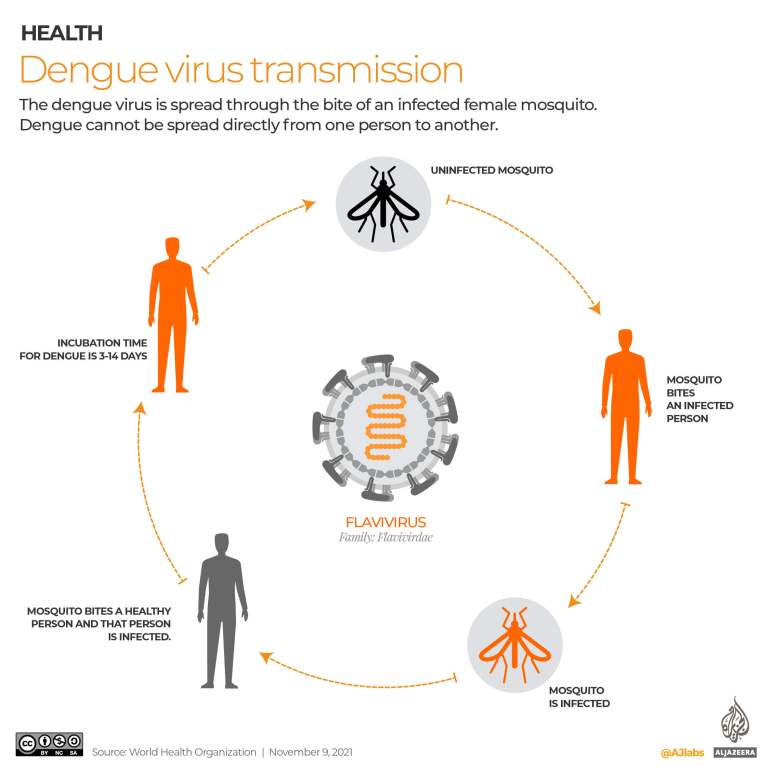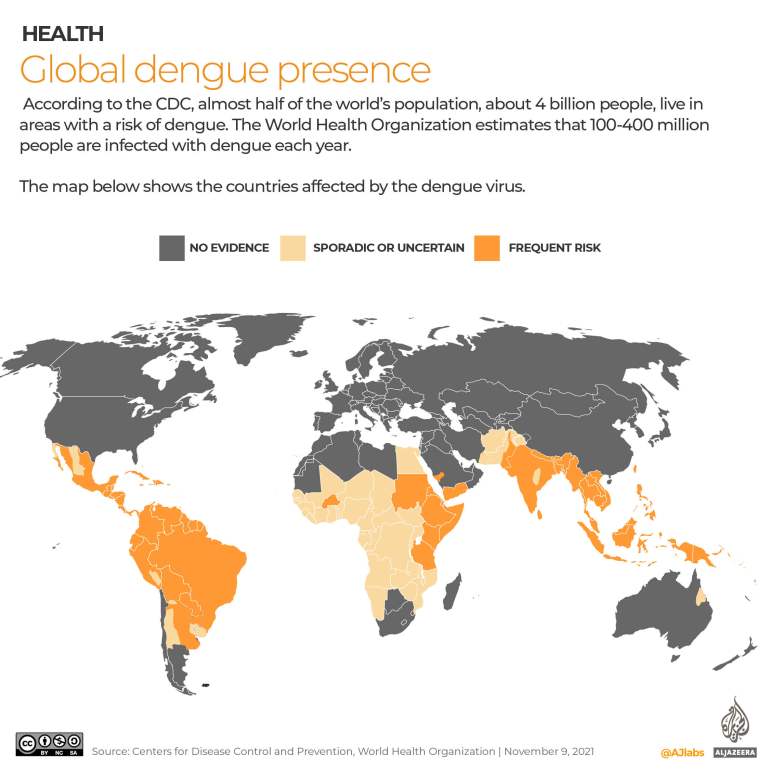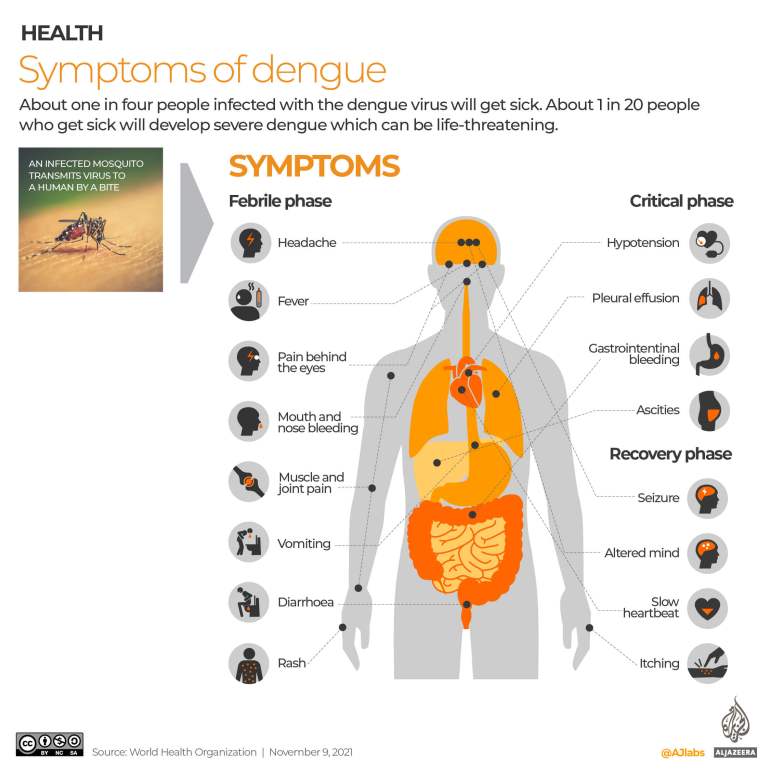India battles spike in dengue cases amid COVID pandemic
New Delhi, India â€" Wrapped in a thick blanket, 15-year-old Nikhil Mandal is lying on a bed inside Lok Nayak Jai Prakash Narayan (LNJP) Hospital in India’s capital New Delhi.
Mandal’s blood platelet count has dropped to an alarming 8,000 after he developed severe chills and high fever and was diagnosed with dengue, with his family fearing his condition might worsen further.
Mandal is among nearly 1,170 cases of dengue fever reported over the past week in New Delhi as India battles yet another health crisis amid the COVID-19 pandemic. In all, 2,708 cases have been reported in the city so far this year.

At least nine people have died of the disease in the Indian capital, the highest such fatalities in the city this year since 2017 when the official death count hit 10.
As New Delhi’s hospitals see a steady flow of dengue patients, the government has directed them to use the beds reserved for COVID-19 patients.
To fight his fever, Mandal needs to maintain an optimum platelet count that necessitates regular blood transfusion.
“I am very scared. I don’t know what to do. His platelet count is decreasing and I have been asked by doctors to arrange a donor,†Mandal’s mother Puja told Al Jazeera.
“Where will I arrange the donor?†she asked, adding that her husband, who is suffering from back pain, is home taking care of their two other children.
In the same ward of the government-run hospital, 20-year-old Irshad Hussain is on a bed opposite Mandal.
 Irshad Hussain with his father at New Delhi’s LNJP Hospital [Bilal Kuchay/Al Jazeera]
Irshad Hussain with his father at New Delhi’s LNJP Hospital [Bilal Kuchay/Al Jazeera] Hussain was tested positive for dengue earlier this week after he complained of a high fever.
“We thought he had fever because of tuberculosis, which he was diagnosed with three months back. But when we ran some tests, he was diagnosed with dengue and since then he has been admitted here,†his father Sajad Husain told Al Jazeera.
“We were taking all the precautions for COVID and now we have dengue. We don’t know what’s happening,†he said.
LNJP Hospital authorities told Al Jazeera that approximately 100 patients with high fever are admitted there every day and most of them test positive for dengue.
“The number of COVID patients has decreased tremendously and we only have a few patients but now we are getting dengue patients,†said Dr Ritu Saxena, the hospital’s deputy medical superintendent.

The situation is no different in other hospitals in the city, home to nearly 190 million people.
Dr Atul Gogoi of Sir Ganga Ram Hospital told Al Jazeera they are receiving 50 to 60 patients every day with acute illness, most of whom turn out to have dengue, once tested.
“We can say 80 to 90 percent of the patients with a short duration of fever are generally turning out to be dengue positive,†he said, adding that the situation has put pressure on the hospital’s infrastructure.
Dr Gogoi said they are currently able to accommodate the patient inflow given there was already a setup in place for COVID-19 patients.
“But if the trend continues, then it’s going to be difficult,†he said.

Across the world’s second-most populous nation, cases of the mosquito-borne viral infection have seen an abrupt spike towards the end of the monsoon season. A Health Ministry statement last week said a total of 1,16,991 dengue cases were reported across the country.
In 2017, India reported 1,88,401 dengue cases â€" the highest in the past 20 years.
Last week, India’s Health Ministry rushed expert teams to nine states and federal territories with a high dengue caseload to assist the local governments in controlling the spread of the disease.
The first signs of dengue outbreak this year came in late August when a hospital in Firozabad in Uttar Pradesh reported nearly 38 deaths from a “mystery feverâ€.
Health experts later said there was no mystery â€" it was mostly dengue.
Dr Gagandeep Singh Grover, a programme officer for vector-borne diseases in the northern state of Punjab, told Al Jazeera they have recorded nearly 19,000 cases of dengue this year.
“This year, it has broken all the records in Punjab,†he said, adding that more than 15,000 of those cases were recorded since last month.
Dr Grover attributed the sharp spurt in dengue cases to the unexpected rainfall in October.
Another health official in the Himalayan state of Uttrakhand told Al Jazeera they have recorded 716 dengue cases this year.
In other Indian states, Rajasthan reported more than 13,000 cases this year, neighbouring Haryana reported more than 8,000, and Tamil Nadu in the south recorded 3,750 cases this year.
Health experts blame the rising number of vector-borne diseases on delayed monsoons and the unexpected heavy rains in October.
“Mosquito breeding is the main factor which is more during the monsoons,†said LNJP’s Dr Saxena.
Dr Grover from Punjab said: “There was more rain this year, they were erratic. And the last rain we received was in October. All the conditions were favourable for the mosquitoes to breed.â€
As temperature dips across north India, dengue cases are expected to decrease.
“In the next couple of weeks, as the weather becomes cooler, mosquito breeding and virus transmission should go down and that is the only way we could get a respite from this dengue surge,†said Dr Gogoi of New Delhi’s Sir Ganga Ram Hospital.
0 Response to "India battles spike in dengue cases amid COVID pandemic"
Post a Comment